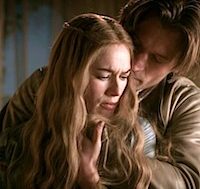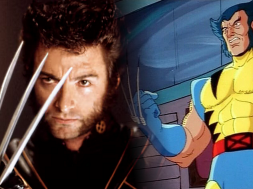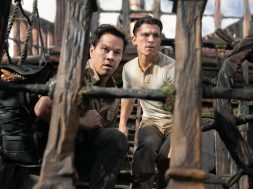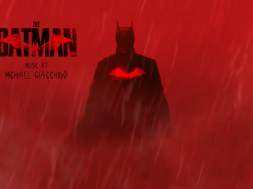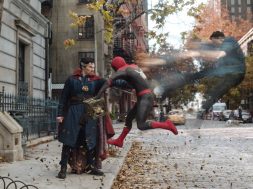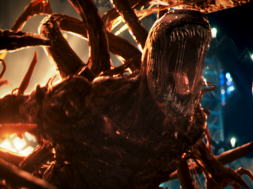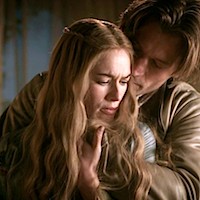
Sexual violence is a longstanding trope in Game of Thrones, yet one instance seems to have garnered more attention that others. It has now been a few weeks since the episode The Breaker of Chains caused a not inconsiderable splash.
That’s not surprising if I am honest; popular show shoots problematic scene – fallout is expected.
Admittedly said fallout was somewhat self-inflicted. The showmakers queered (or perhaps further queered) the water. Hillary Kelly writes:
Alex Graves, the director […] said: Well, it becomes consensual by the end, because anything for them ultimately results in a turn-on, especially a power struggle. […] Graves was pilloried for the description—and rightly so. Adding to the strangeness was the fact that he’d told The Hollywood Reporter earlier that day that “Jaime comes in and he rapes her.” In that particular interview, he called the act “forced sex.”

It would be a fool’s errand to unravel what Graves was up to by giving two different accounts of the same scene. Whatever the reason, the existence of two explanations doubtless contributed to the heatedness of the debate the now infamous scene sparked, the inherently incendiary status of rape notwithstanding. Having let the time pass, and sifted through the dust raised in the skirmish, I want give my take on the matter. Before I begin I must confess to not having read the George R.R. Martin books (though that may be subject change soon…). So, what follows will be a view of the TV series as a standalone project. I should also add, if only as a side note, that the episode in question was not devoid of merit. Far from it. The Breaker of Chains has a string of good speeches and dialogue, not to mention a feat of impressive equine choreography. For this Alex Graves deserves no small credit, which must be acknowledged even if the scene under scrutiny was mismanaged. With that caveat, let’s proceed.
The Breaker of Chains starts with a lot of things going on at once, as is the general rule. We start with a close up of the King Joffrey’s dead, blood-spattered face. His mother, devastated looks to her brother, the dwarf Tyrion, and screams for his capture. Meanwhile, Tyrion’s wife, Sansa Stark, has been spirited away in a machination of Petyr Baelish, or Little Finger. In the North the Night’s Watch are stewing over the prospect of an invasion of the Seven Kingdoms by the normally nomadic Wilding Tribes. Still further North, Bran and his cohort continue to be frustrated in their attempts to meet the three-eyed raven that has haunted his dreams since the fall at Winterfell. Daenerys, on the other side of the world, marches on the city Meereen. En route she encounters the bodies of dead slaves that are distributed ostensibly as milestones to the the city. While all of this (and more) is going on, King’s Landing prepares for Tyrion’s trial and Joffrey’s funeral.
Standing in the Great Sept of Baelor (the capital city’s largest church), Cersei and her second son Tommen look upon the corpse of the dead monarch. Tywin, grandfather of the deceased and Hand-of-the-King, interrupts with a lecture on the general principles of Kingship, an imitation Socratic dialogue (a sight that manages to be impressive, inappropriate and darkly comic all at once). Stealing away the prospective replacement Lord of the Seven Kingdoms, Jaime enters. Passing the pair, he offers terse consolation to the yet-to-be-crowned-king and an unspoken greeting to the Hand-of-the-same. Jaime then orders the room be vacated by all non-family members. In private he attempts to comfort his sister/mother of his children, who turns away at the touch of his fake hand. He becomes angry and proceeds to rapes her, mere feet from the body of their first-born son.
The effect this scene will have on the series in the long-term is, in my mind, too early to evaluate. However, Sonia Saraiya has alluded to the possibility that the showmakers are building toward something. She writes:
[…] given what we have seen Cersei Lannister capable of—her ex-husband is hardly the only man she’s had killed—is it even conceivable that she would stand for it? Jaime raping Cersei is a major anomaly for these two characters—even based purely on what we’ve seen in the show. It’s just not something that either character would do.
By contrast, Scott Meslow, writing for THE WEEK, argues that while the show’s previous depictions of misogyny have been understandable, he:
can’t think of any comparable defense for the rape scene in “Breaker of Chains,” which feels like a naked and ill-conceived attempt to push Game of Thrones into even darker territory.
In light of Saraiya’s comments, it may well be that the defence is yet to materialise. Entertaining, such contingencies is not a proof of anything of course, absence of evidence is not itself evidence. Nevertheless, The Breaker of Chains is only Episode 3. At this stage we have to entertain the possibility that the rape is part of a larger plot-line that is yet to come to fruition. After all, if we look at the recent revelation of Lysa Arryn, we discover a plot-line that dates back to Season 1. Incidentally, I suspect that a plot-line providing the long-term rationale just described is viable to develop alongside Tyrian’s trial, the twins having radically different views as to his culpability (though that’is just conjecture, a hunch).
In any case, the scene in question, irrespective of both its long-term implications and Graves’ ambiguous intentions, is not a complete disaster. Furthermore, it has immediate implications for both characters which we, the audience, must consider, implications I want to explore here. I’ve already covered the discrepancy between intent and outcome. Still,when I say the scene is problematic that’s not what I am driving at. To clarify, I am not saying that it is not a rape scene. Admittedly, I don’t believe any published commentator has disputed this fact, though Andrew Romano of the Daily Beast expressed the view that we should pretend it did not happen… Following Mr Romano’s advice might be convenient but, speaking for myself, I must decline. I also don’t exactly mean problematic in the sense that the scene is flawed. I mean problematic as in: difficult to classify. I’m using what certain twee, posturing persons might call the “Queen’s English” (a term that especially twee folk simply abbreviate to “the Queen’s”). Shortly, the ways we might have come to regard both Cercei and Jaime is challenged.

It is Cersei I want to examine first. The eldest of the Lannister siblings has long been a hated character or a character viewers have loved to hate. As the show has progressed she has been humanised. It’s a timeless distinction: the performance and the script while not excusing Cersei from her undertakings does explain the reasons for why she is who she is. Lena Heady continues to make the character an engaging presence and has even achieved moments of hard won sympathy (fleeting though those instances may be). Still, disliking her has practically become a hobby for many. The sudden act of sexual violence disrupts this response. A hallmark of the show is that it consistently denies complacency. You might not like Cersei but you can’t condone what befalls her without becoming like her or, more accurately, without ceding the moral high ground.
There are a host of examples in the Game of Thrones of good things happening to bad people. There’s also a plethora of cases where bad things befall good people. Therefore, when bad things happen to bad people there is often an accompanying sense of justice. The recent fate of Karl Tanner being perhaps a case in point. However, the fact that bad things happen to bad people cannot necessarily be celebrated; it’s not a rule you can just throw around. Though all may despise the treachery of Theon Greyjoy, many pity him his suffering at the hands of Ramsey Snow. To respond to Meslow directly, territory has not been broken without cause. Bad things happen to bad people and indiscriminate rejoicing at such happenstances is lazy. You might have felt a grim sense of satisfaction to see the child King turning purple at his own wedding, I did, but such a reaction to the aftermath is not possible. Even if you don’t shed a tear for Cersei, lumping mother and son together and regarding them as the same is a complacency that the show does not afford.
And now Jaime. There has been a lot of talk in the press of how Jaime’s actions let the fans down, including an article Amanda Marcotte. I concur with that: “If Graves intended to depict consensual sex in the end, he completely failed”, I take issue with the former assessment. However, the article continues:
Game of Thrones spent all last season carefully redeeming Jaime Lannister, turning the once villain into something of a hero. Sunday night, director Alex Graves threw that all away by having Jaime rape his sister/lover in front of the body of their recently murdered son. […] Turning it into a rape just turns Jaime into a monster, the kind that would rape a woman he claims to love in front of her dead son to punish her for being “hateful.”
Having mentioned one hallmark in relation to Cersei, another must be considered here. Specifically, how the show periodically foregrounds its characters’ baser elements and the extreme forms of behavior that results. Hillary Kelly points out:
[…] it’s hard to embrace the argument that, only now, the showrunners have truly ruined “Game of Thrones”‘s new golden boy (pun sorta intended). Is Jaime unredeemable in a way that others on the show are not? Is he worse than The Hound, who cut down a child upon instruction, but whom we now find almost charming in his protection of Arya? Is he worse than Daenerys, who uses her birthright as an excuse to march across a continent murdering anyone who steps in her way? Is he worse than Khal Drogo, who was also a rapist but whose wife came to revere him? None of them have been called irredeemable or unsalvageable or unpardonable.
To say Jaime failed the fans implies that his was an example to be followed, a non sequita if ever there was one. The outrage that resulted from Jaime’s actions are in part the result of the prevalent belief that we as viewers are owed something. Westeros is a world of compromised and corrupt persons; that is part of the appeal. Such an environment makes the prospect of a character like the Jaime Lannister of Season 3 enticing.
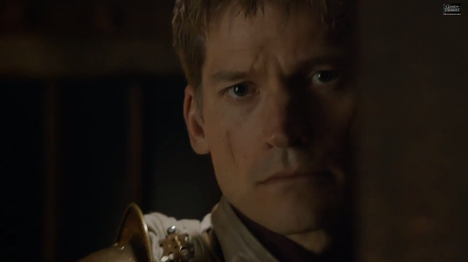
The standard pattern of characterisation is people becoming more compromised or of being revealed as increasingly corrupt. So, a character revealed to be less bad than previously imagined and redeemed, would constitute a pleasing deviation from the norm. For the duration of Season 3 Jaime Lannister – albeit only in part – seemed to fit the bill. The deed that won him the title Kingslayer was the result of killing one lunatic to save the innocent lives of those in the capital. Even pushing the young Bran Stark out of a window was an act of love, again albeit a perverse act of love. Moreover, in the midst of secrets and intrigue, the affection of their incestuous relationship was hitherto a rare source of genuine affection, misplaced though that affection was. Previously, Jaime’s bad actions revealed some redeeming qualities. Here there are none.
That, I am convinced, is why the scene works. Whether or not it is what Graves was angling for, the scene works, and works because it depicts actions that have neither upsides nor excuses. They have reasons or causes but that’s not the same thing. Having undergone the frustrated attempts to return to his sister/lover, Jaime is devastated at to given the cold shoulder. Approaching her in the Sept he only encounters revulsion at his prosthetic hand. The result of these rejections (the rape) may be passable in the middle-age world that is Westeros, but for us, the 21st century viewers, it is not. Cersei’s rape prevents against her from being seen as comparable to her offspring, but it also prevents her brother from being put on a pedestal. Following the events of the previous season, Jaime’s choice is a check against us, the audience, holding him in disproportionately high esteem. The inherent danger to the revelations in the last season were that they might lead to an unrealistic view of Jaime’s character, a view which is cut short by an act of sexual violence. We are reminded of the fact that this man is from another time and has values that are far removed from our own. It may yet prove possible to admire aspects of Jaime’s character, but now any positive reaction to his character can only be conditional.
So, how then is the rape scene problematic? It challenges the presuppositions that we, the audience, have acquired about the characters it involves. The rape scene is preventative for seeing either party within the parameters of labels. It dismantles the view of the twins as existing in diametrically opposed categories of good twin and bad twin, or relatively good twin and relatively bad twin. Therefore, in spite of the questionable matter of it’s genesis, the scene’s bearing on the audience’s regard for character is beyond contestation. Such a simplistic pronouncement is one that this series simply will not permit.
